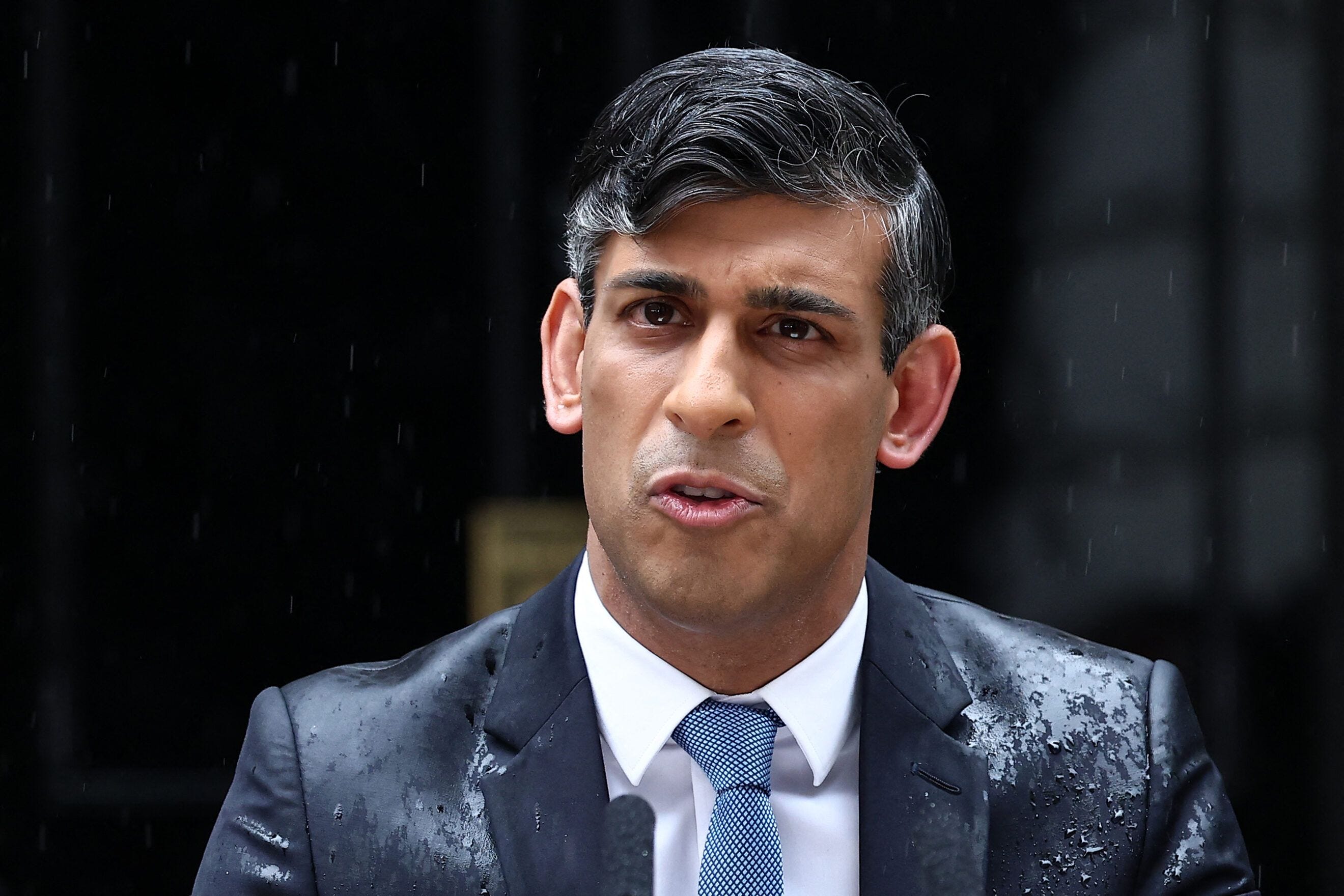Soaking Sunak Calls the Sodding Election
“Calling an Early Election Is an Admission of Defeat”

It was a pitiful sight. Soaked and literally washed-out, the feeble thin British Prime Minister, Rishi Sunak, made an announcement that caught many in his party by surprise. On 4 July, the United Kingdom will be going to the polls. Necks will find themselves in nooses and placed in the guillotine—metaphorically speaking. The stretch to slaughter has been laid out. The oddity of this drenched occasion was made all the more pungent by a protester playing, in most audible fashion, the anthem of Tony Blair’s Labour’s victory in 1997, Things Can Only Get Better.
The PM’s speech rattled off the usual trimmings about a world dangerous and uncertain, as if various preceding eras were not. With the lumpy historical discordance, he suggested that the world was “more dangerous than it has been since the end of the Cold War.” Savage Russian President Vladimir Putin was one to blame for his “brutal war in Ukraine.” Islamist extremism continued to bloody the map of the Middle East. On the bookkeeping front, he claimed to have restored “economic stability,” a dagger remark to his predecessor, Liz Truss, who had a distinct talent for giving the economic books away.
The hordes of the Middle Kingdom and irregular migration also come in for a wet lettuce belting. China was a country “looking to dominate the 21st century by stealing a lead in technology and migration is being weaponised by hostile states to threaten the integrity of our bodies.”
As for the Labour Party, his opponents and contenders for government, no credible basis could be found. He did not “know what they offer. And in truth, I don’t think you know either. And that’s because they have no plan.” Sunak has a point, but wise oppositions hankering for government tend to release their program closer to the election date than their greener counterparts.
The conservative stable in Sunak’s party, and the commentary box, were making the obvious point: why now instead of waiting till later in the year? If you are doing well in readjusting the direction of the economic ship, surely, it’s good to be reassured it’s heading the right direction and gloating about it to the voters before they cast the vote? Such questions are pertinent, given that the UK economy emerged from the stifling chrysalis of recession in the first quarter with 0.6%, with an inflation rate of 2.3%, a touch above the 2% target set by the Bank of England.
Reactionary, brutal, and cruel, Sunak could also boast that the Rwanda legislation, intended as part of a vain effort to deter boat arrivals to UK shores, had at least passed, despite being widely condemned, and reviled, by the legal fraternity and activist groups.
Strategizing for incumbent governments facing cool slaughter by an unhappy electorate is never an easy call. Isaac Levido, the shadowy Australian Conservative election strategist, plumped for some time later this year. Liam Booth-Smith, Sunak’s Chief of Staff, aided by the views of deputy prime minister, Oliver Dowden, and political secretary James Forsyth, preferred the starter gun to go off earlier. Best bring the cull on.
Commentary from various Conservatives tended towards Levido’s view. One senior figure, speaking to the BBC, confounded “the assumption of the entire establishment, not to mention Tory MPs, that it would be autumn.”
The Spectator, Britain’s consistently conservative magazine, was certain about the implications of premature electioneering. “Calling an early election is an admission of defeat—and that, on everything from public finances to public services, the worst is yet to come.”
Since the announcement, the Tories have been paternalistic in the hope that anyone will notice. Fatherly suggestions have come in the form of proposed mandatory national service, a case of carrot, stick and tease to discipline and condition the youth of the country. Were he to retain office, Sunak promises to reintroduce a measure that seems cumbersome and unconvincing. These are his words at a campaign event at Buckinghamshire: “It is going to foster a culture of service which is going to be incredibly powerful for making our society more cohesive, and in a more uncertain and dangerous world it’s going to strengthen our country’s security and resilience.”
Cruising onto TikTok, a platform otherwise viewed with Sinophile suspicion, Sunak made the point that, in line with other nation states, “we will provide a stipend to help with living costs for those doing the military element alongside their training.” Promises of sanctions for not following the program, were it to be introduced, are already being mooted by the likes of Tory Party deputy chairman James Daly. “If you are fit and healthy and you are able to make a contribution to your wider community to do something for your area, I have faith that young people will take that opportunity.”
In a sign that this government is spluttering in its terminal doom, Home Secretary James Cleverly offered a less punitive view. “There’s no one going to jail over this.” Foreign Office minister Anne-Marie Trevelyan preferred to toss the matter over to the royal commission intended to investigate the details of the proposal were fines to apply to disobedient children unwilling to serve their country. Defence personnel minister Andrew Morrison, within twenty-four hours of the election being called, walled off the possibility that “any form of national service” would be introduced.
For any government, confusion in the already scatty ranks spells death. In the case of the Tories, a wheezing sense of entropy will continue to soften them for the chop. While the losses may be checked come the date the votes are cast, the Tories are set for an all-country drubbing. Were Sunak to offer a decent salvaging from the blood bath for his party, he might almost be forgiven.



